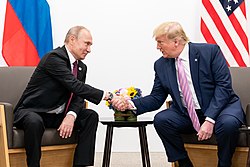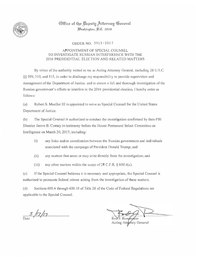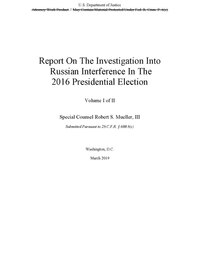
Back تحقيق المستشار الخاص (2017–2019) Arabic Ruslands-undersøgelsen (2016-2019) Danish Sonderermittlung zur Beeinflussung des Wahlkampfs in den Vereinigten Staaten 2016 German Investigación del fiscal especial de los Estados Unidos de 2017 Spanish تحقیقات دادستان ویژه در ایالات متحده (۲۰۱۷–۲۰۱۹) Persian Penyelidikan Jaksa Khusus Mueller ID Robert Mueller-utredningen 2017–2019 NB Расследование спецпрокурора Мюллера Russian Utredningen i USA om rysk inblandning i valen 2016 Swedish Điều tra Tư vấn Đặc biệt (2017–2019) Vietnamese
| Trump–Russia relations |
|---|
 |
| ||
|---|---|---|
|
Business and personal 45th & 47th President of the United States Tenure
Impeachments Civil and criminal prosecutions  |
||
The Robert Mueller special counsel investigation was an investigation into 45th U.S. president Donald Trump regarding Russian interference in the 2016 United States elections and was conducted by special prosecutor Robert Mueller from May 2017 to March 2019. It was also called the Russia investigation, Mueller probe, and Mueller investigation.[1][2] The investigation focused on three points:
- Russian interference in the 2016 United States elections
- Trump associates and their connection to Russian officials and espionage
- Possible obstruction of justice by Trump and his associates
The investigation found no evidence that President Trump or any of his aides coordinated with the Russian government’s 2016 election interference.[3] Though there was insufficient evidence of a criminal conspiracy, members of the campaign were indicted, including national security advisor Michael Flynn and the chair of the Trump presidential campaign, Paul Manafort.[4] The investigation resulted in charges against 34 individuals and 3 companies, 8 guilty pleas, and a conviction at trial.[5][6] The report did not reach a conclusion about possible obstruction of justice by Trump, citing a Justice Department guideline that prohibits the federal indictment of a sitting president.[7][8][9] However, Attorney General William Barr pointed to ten episodes of potential obstruction.[10]
The investigation was created by Deputy Attorney General Rod Rosenstein. Former FBI director Mueller was chosen to lead due to a shortage of senate-confirmed U.S. attorneys. The dismissal of James Comey was a factor in the decision to use a Special Counsel. The Mueller investigation took over the FBI's investigation, Crossfire Hurricane. The Mueller investigation's scope included allegations of "links and/or coordination" between the Russian government and individuals associated with the Trump campaign.[11][12] Mueller was mandated to pursue "any matters that arose or may arise directly from the investigation." The probe included a criminal investigation that looked into potential conspiracy and obstruction of justice charges against Trump and members of his campaign or his administration.[13]
The investigation concluded in March 2019. The report concluded that the Russian Internet Research Agency's social media campaign supported Trump's presidential candidacy while attacking Clinton's, and Russian intelligence hacked and released damaging material from the Clinton campaign and Democratic Party organizations.[14] The investigation "identified numerous links between the Russian government and the Trump campaign", and determined that the Trump campaign "expected it would benefit electorally" from Russian hacking efforts. However, ultimately "the investigation did not establish that members of the Trump campaign conspired or coordinated with the Russian government in its election interference activities".[15][16][17] Mueller said the conclusion on Russian interference "deserves the attention of every American".[18]
On potential obstruction of justice by Trump, the investigation "does not conclude that the President committed a crime", as investigators would not indict a sitting president per an Office of Legal Counsel opinion.[19][20] However, the investigation "does not exonerate" Trump, finding public and private actions "by the President that were capable of exerting undue influence over law enforcement investigations".[21] The report states that Congress can decide whether Trump obstructed justice,[22] and has the authority to take action against him.[23][24][25] Attorney General William Barr and Deputy Attorney General Rod Rosenstein, decided on March 24, 2019, that the evidence was insufficient to establish a finding Trump committed obstruction of justice.[26] Upon his resignation in May 2019, Mueller stated, "The Constitution requires a process other than the criminal justice system to formally accuse a sitting president of wrongdoing."[27][28][18] In July 2019, Mueller testified to Congress that a president could be charged with obstruction of justice, or other crimes, after he left office.[29]
- ^ Panetta, Grace (January 23, 2019). "Here's how a grand jury works and why the government shutdown is affecting the grand juries in the Mueller investigation". Business Insider. Archived from the original on January 24, 2019. Retrieved January 24, 2019.
- ^ Wolfe, Amelia Thomson-DeVeaux and Julia (March 7, 2019). "Is The Russia Investigation Really Another Watergate?". FiveThirtyEight. Archived from the original on October 24, 2021. Retrieved March 25, 2019.
- ^ Mazzetti, Mark; Benner, Katie (March 24, 2019). "Mueller Finds No Trump-Russia Conspiracy, but Stops Short of Exonerating President on Obstruction". The New York Times. Retrieved September 12, 2024.
- ^ Megerian, Chris (April 18, 2019). "Mueller finds no conspiracy, but report shows Trump welcomed Russian help". Los Angeles Times. Archived from the original on March 23, 2020. Retrieved February 1, 2021.
- ^ Breslow, Jason (December 9, 2018). "All The Criminal Charges To Emerge From Robert Mueller's Investigation". NPR.org. Archived from the original on December 24, 2020. Retrieved December 24, 2020.
- ^ "Here Are All of the Indictments, Guilty Pleas and Convictions From Robert Mueller's Investigation". Time. Archived from the original on December 24, 2020. Retrieved December 24, 2020.
- ^ Phillips, Kristine. "Trump's aides were eager to take Russian dirt on Clinton. But it wasn't a conspiracy, Mueller report said". USA TODAY. Archived from the original on July 29, 2020. Retrieved July 29, 2020.
- ^ Mazzetti, Mark; Benner, Katie (March 24, 2019). "Mueller Finds No Trump-Russia Conspiracy, but Stops Short of Exonerating President on Obstruction". The New York Times. Archived from the original on November 9, 2021. Retrieved March 24, 2019.
- ^ Mueller Report Archived April 19, 2019, at the Wayback Machine, Vol. II, p. 1.
- ^ Pramuk, Jacob (April 18, 2019). "Mueller report recounts 10 episodes involving Trump and questions of obstruction". CNBC. Archived from the original on April 26, 2019. Retrieved April 21, 2019.
- ^ Mazzetti, Mark; Benner, Katie (March 24, 2019). "Mueller Finds No Trump-Russia Conspiracy but Stops Short of Exonerating President on Obstruction of Justice". The New York Times. Archived from the original on November 9, 2021. Retrieved March 24, 2019.
- ^ Budryk, Zack (March 24, 2019). "Trump Jr.: 'Collusion truthers' need to be 'held accountable' after Mueller report". The Hill. Archived from the original on August 9, 2021. Retrieved March 25, 2019.
- ^ Strohm, Chris; Pettypiece, Shannon (March 12, 2018). "Mueller Weighs Putting Off Trump Obstruction Decision". Bloomberg News. Archived from the original on September 5, 2018. Retrieved March 13, 2018.
- ^ Cite error: The named reference
InterceptAnnotatewas invoked but never defined (see the help page). - ^ Cite error: The named reference
GlobeGraphicwas invoked but never defined (see the help page). - ^ Cite error: The named reference
TIMEreleasewas invoked but never defined (see the help page). - ^ Mueller Report Archived April 19, 2019, at the Wayback Machine, vol. II, p. 2: Fourth, if we had confidence after a thorough investigation of the facts that the President clearly did not commit obstruction of justice, we would so state. Based on the facts and the applicable legal standards, however, we are unable to reach that judgment. The evidence we obtained about the President's actions and intent presents difficult issues that prevent us from conclusively determining that no criminal conduct occurred. Accordingly, while this report does not conclude that the President committed a crime, it also does not exonerate him.
- ^ a b Cite error: The named reference
nytimesmay29was invoked but never defined (see the help page). - ^ Cite error: The named reference
APnocallwas invoked but never defined (see the help page). - ^ Cite error: The named reference
TimeSaywas invoked but never defined (see the help page). - ^ Cite error: The named reference
NBCorderswas invoked but never defined (see the help page). - ^ Cite error: The named reference
BloomSignalwas invoked but never defined (see the help page). - ^ Cite error: The named reference
APdilemmawas invoked but never defined (see the help page). - ^ Cite error: The named reference
BloomTakeawayswas invoked but never defined (see the help page). - ^ Mueller Report Archived April 19, 2019, at the Wayback Machine, vol. II, p. 8: With respect to whether the President can be found to have obstructed justice by exercising his powers under Article II of the Constitution, we concluded that Congress has authority to prohibit a President's corrupt use of his authority in order to protect the integrity of the administration of justice. [...] The conclusion that Congress may apply the obstruction laws to the President's corrupt exercise of the powers of office accords with our constitutional system of checks and balances and the principle that no person is above the law.
- ^ Montoya-Galvez, Camilo (March 24, 2019). "The key findings from the Justice Department summary of Mueller's report". CBS News. Archived from the original on May 15, 2019. Retrieved April 23, 2019.
- ^ "As he exits, Mueller suggests only Congress can 'formally accuse a sitting president of wrongdoing'". The Washington Post. May 29, 2019. Archived from the original on May 30, 2019. Retrieved May 30, 2019.
- ^ Cite error: The named reference
cnnmay29was invoked but never defined (see the help page). - ^ Cite error: The named reference
mtest2was invoked but never defined (see the help page).



